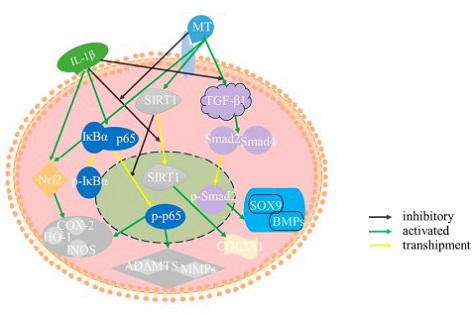Nikhil Prasad Fact checked by:Thailand Medical News Team Jun 06, 2024 10 months, 1 week, 11 hours, 42 minutes ago
Arthritis Updates: Arthritis, a chronic inflammatory condition affecting millions globally, often leads to debilitating pain and reduced quality of life. Among various types, osteoarthritis (OA) is prevalent, characterized by the degradation of cartilage, inflammation, and pain. Traditional treatments focus on symptom management, but recent research suggests that melatonin, a hormone known for regulating sleep, might offer a novel approach to treating arthritis. This
Arthritis Updates news report explores the groundbreaking study by researchers from Heilongjiang Key Laboratory Animals and Comparative Medicine, College of Veterinary Medicine, Northeast Agricultural University, Harbin-China on melatonin's role in delaying arthritis inflammation and reducing cartilage matrix degradation.
 Mechanism diagram - Melatonin in Arthritis Treatment
The Science of Cartilage and Arthritis
Mechanism diagram - Melatonin in Arthritis Treatment
The Science of Cartilage and Arthritis
Cartilage is a flexible, smooth connective tissue that covers the surfaces of joints. Its integrity is vital for joint function, and it relies on chondrocytes for extracellular matrix (ECM) production. In osteoarthritis, the balance between cartilage regeneration and degradation is disrupted, leading to cartilage erosion. This process involves enzymes like matrix metalloproteinases (MMPs) and inflammatory cytokines such as interleukin-1β (IL-1β) and tumor necrosis factor (TNF). These factors contribute to the degradation of proteoglycans and type-II collagen (COL2A1), crucial components of cartilage.
Melatonin’s Therapeutic Potential
Melatonin (MT), known for its antioxidant and anti-inflammatory properties, emerges as a promising candidate for cartilage regeneration and protection. The study delves into melatonin's mechanisms on chondrocytes both in vivo (within living organisms) and in vitro (outside living organisms). The research focuses on melatonin’s influence on the SIRT1-mediated NF-κB/Nrf2/TGF-β/BMPs pathway, a critical signaling route in inflammatory and oxidative stress responses.
Methodology
The study involved three groups of rats: a sham group, a model group (using anterior cruciate ligament transection (ACLT) to induce OA), and a melatonin-treated group (receiving 30 mg/kg of melatonin). Pathological changes in articular cartilage, synovium, and subchondral bone were evaluated through various staining techniques. Additionally, serum cytokine levels were measured using enzyme-linked immunosorbent assay (ELISA).
In vitro experiments involved primary chondrocytes exposed to IL-1β to simulate an inflammatory environment. These cells were treated with melatonin and compared with control and inhibitor groups. Techniques like Western blotting (WB), quantitative RT-PCR (q-PCR), and immunofluorescence (IF) were employed to analyze protein expression and gene transcription.
Results
-Melatonin Alleviates Cartilage Pathology
The study found that melatonin significant
ly mitigated cartilage degeneration in the ACLT model. The melatonin-treated group exhibited smoother cartilage surfaces, reduced chondrocyte loss, and increased subchondral bone thickness. These findings were supported by lower Mankin scores, indicating less severe cartilage damage compared to the untreated OA model.
-Reduction in Synovial Inflammation
Synovial inflammation, a hallmark of arthritis, was markedly reduced in the melatonin-treated group. The synovium showed less cell proliferation and inflammatory cell infiltration. This suggests that melatonin effectively suppresses inflammatory responses within the joint.
-Improved Subchondral Bone Integrity
Subchondral bone, crucial for joint support and shock absorption, showed significant improvements with melatonin treatment. The treated group maintained a smoother bone-cartilage interface and exhibited fewer osteoclasts; cells responsible for bone resorption.
-Modulation of Cartilage Metabolism Proteins
Melatonin influenced the expression of various proteins involved in cartilage metabolism. The treatment reduced levels of matrix-degrading enzymes like MMP-3, MMP-13, and ADAMTS-4 while increasing protective matrix proteins like aggrecan and COL2A1. This balance is essential for maintaining cartilage integrity and preventing further degradation.
Mechanistic Insights
-Activation of the SIRT1 Pathway
Melatonin’s effects are mediated through the activation of the SIRT1 pathway. SIRT1, a histone deacetylase, plays a crucial role in aging, metabolism, and inflammation. The study demonstrated that melatonin upregulated SIRT1 expression, counteracting the IL-1β-induced reduction. The introduction of the SIRT1 inhibitor, Selisistat (EX527), reversed melatonin’s beneficial effects, underscoring SIRT1's pivotal role.
-Inhibition of NF-κB and Activation of Nrf2
Melatonin inhibited the NF-κB pathway, known for promoting inflammation and cartilage degradation. Concurrently, it activated the Nrf2/HO-1 pathway, enhancing the production of antioxidant enzymes. This dual action helps mitigate oxidative stress and inflammation, protecting chondrocytes from damage.
-Stimulation of the TGF-β/BMPs Pathway
Transforming growth factor-beta (TGF-β) and bone morphogenetic proteins (BMPs) are vital for cartilage repair and regeneration. Melatonin increased the expression of TGF-β1 and p-Smad2 proteins and upregulated genes related to cartilage formation like BMP2, BMP7, SOX9, and Runx2. These factors contribute to cartilage synthesis and repair, suggesting that melatonin not only prevents degradation but also promotes regeneration.
Discussion and Future Directions
This study provides compelling evidence of melatonin’s protective effects on cartilage and its potential as a therapeutic agent in osteoarthritis. By modulating key signaling pathways, melatonin reduces inflammation, oxidative stress, and cartilage degradation while promoting repair mechanisms.
Future research should explore melatonin’s effects on subchondral bone in greater detail, utilizing advanced imaging techniques like micro-CT. Additionally, clinical trials are necessary to confirm these findings in human subjects and determine optimal dosages and administration methods.
Conclusion
Melatonin offers a promising new avenue for arthritis treatment, targeting multiple pathways to protect and regenerate cartilage. Its potential to improve joint health and reduce the burden of osteoarthritis could revolutionize arthritis management, providing hope for millions suffering from this chronic condition.
The study findings were published in the peer reviewed International Journal of Molecular Sciences.
https://www.mdpi.com/1422-0067/25/11/6202
For the more
Arthritis Updates, keep on logging to Thailand Medical News.
Read Also:
https://www.thailandmedical.news/news/herbs-phytochemicals-celastrol-from-tripterygium-wilfordii-inhibits-rheumatoid-arthritis-progression-by-targeting-the-commd3-8-complex
https://www.thailandmedical.news/news/med-news-stanford-study-find-metformin-use-is-associated-with-lower-incidence-of-osteoarthritis
https://www.thailandmedical.news/news/arthritis-news-study-finds-that-rheumatoid-arthritis-linked-to-elevated-risk-of-aortic-stenosis
